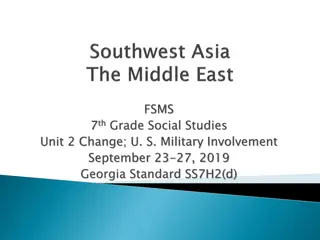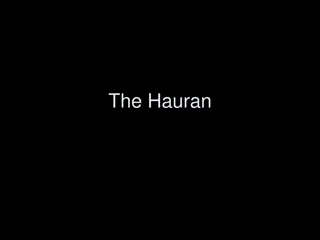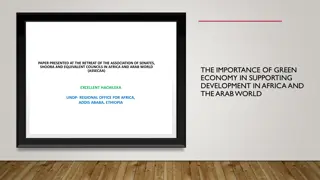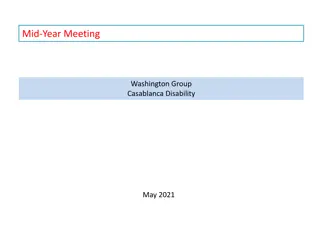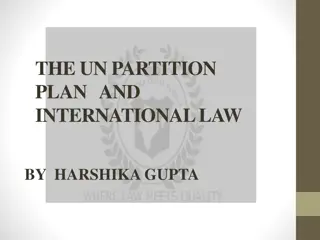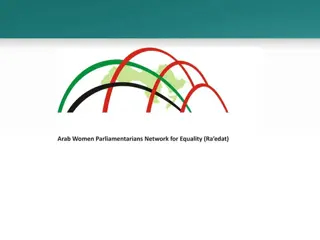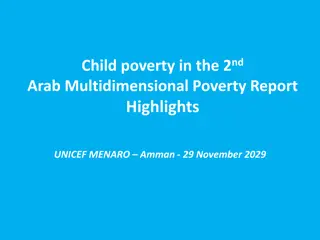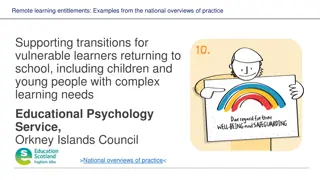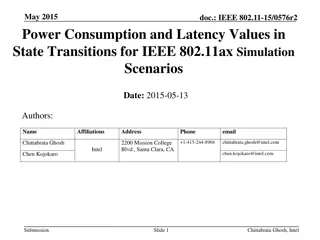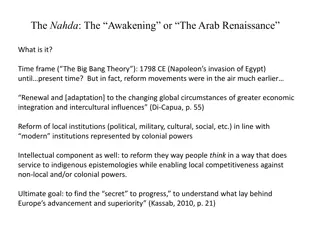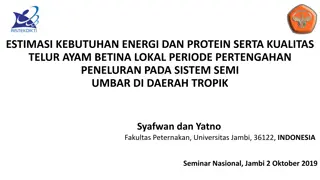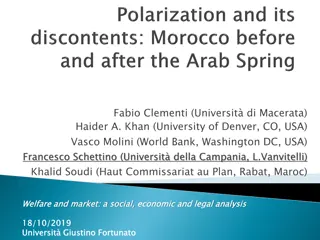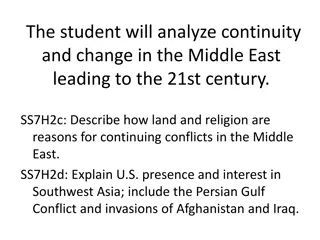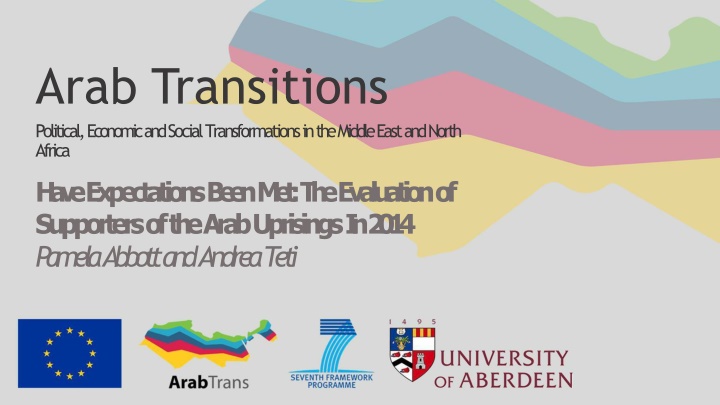
Evaluating Support for Arab Uprisings in the MENA Region
Explore the evaluation of supporters of the Arab Uprisings in 2014, analyzing the political, economic, and social transformations in the Middle East and North Africa. Delve into the background, research methods, key questions, and insights on support across various countries.
Download Presentation

Please find below an Image/Link to download the presentation.
The content on the website is provided AS IS for your information and personal use only. It may not be sold, licensed, or shared on other websites without obtaining consent from the author. If you encounter any issues during the download, it is possible that the publisher has removed the file from their server.
You are allowed to download the files provided on this website for personal or commercial use, subject to the condition that they are used lawfully. All files are the property of their respective owners.
The content on the website is provided AS IS for your information and personal use only. It may not be sold, licensed, or shared on other websites without obtaining consent from the author.
E N D
Presentation Transcript
Arab Transitions Political, Economic and Social Transformations in the Middle East and North Africa H a v e Expectations B e e n M e t : T h e Evaluation of Supporters of the Arab Uprisings I n 2 0 1 4 Pamela Abbott and Andrea Teti
Background The Paradox of Unhappy Development Arab Uprisings in 2011 seen as popular protest against authoritarian regimes but Political Economy analysis suggests that the drivers of the Uprisings were the outcome of a complex interaction between political, economic and social development: Liberalisation of the economy and the rise of crony capitalism; Economic growth and improvements in human development accompanied by poor or worsening living conditions and poor labour market conditions combined with lack of freedom; The implicit social contract of redistribution with limited voice no longer seen as adequate. Legitimacy of government questioned especially by middle classes. AB11 (2011) nominated as two most important demands of Uprisings: 80% Egyptians and Tunisians for improved economic situation 72.7% Egyptians and 62.8% Tunisians against corruption 16.5% Egyptians and 43.6% Tunisians for civil and political freedoms and v totalitarianism
Research Methods Public opinion survey looking at political, economic and social attitudes and behaviour carried out in Egypt, Iraq, Jordan, Libya, Morocco and Tunisia 2014 Nationwide stratified probability surveys with sample proportional to size within countries Achieved sample after quality assurance checks Egypt Iraq Jordan Libya - 1, 540 Morocco - 1, 777 Tunisia - 1, 215 1,525 - 1, 613 - 2, 145
Key questions How much support was there for the Uprisings and did this vary across the MENA countries? Who supported the Uprisings and did this vary across the MENA Countries? Why did they support the Uprisings? Do they think that progress has been made in meeting their demands? What hope do they see for the future?
Who Supported the Arab Uprisings
H o w Many People Say they Supported the Uprisings, % Aged 21+ in 2014 SUPPORT FOR AND PARTICIPATION IN THE ARAB UPRISINGS, % BY SELECTED MENA COUNTRIES AGED 18+ YEARS IN 2011 All Supporters Particpants 72 56.3 55.3 31.1 27.7 24 15.4 13.8 7.5 3.3 4.3 11.9 EGYPT IRAQ JORDAN LIBYA MOROCCO TUNISIA
Supported Arab Uprisings , % of Supporters by Age (in 2014) and Country 21-35 36-55 56+ 75.5 68.2 68.1 59.2 55.1 48.8 33.1 33 30 29.7 21.3 17.8 14.9 14.6 13.5 13.4 12.7 12.6 EGYPT IRAQ JORDAN LIBYA MOROCCO TUNISIA
% of Men and Women (21+ in 2014) that Supported the Arab Uprisings, by Country Male Female 76.7 67.3 59.9 50.5 36 34.9 26 22.3 16.9 14.4 13.8 13.2 EGYPT IRAQ JORDAN LIBYA MOROCCO TUNISIA
Difference in Ratio of Male to Female Supporters and Participants Supporters Particpants 3.7 2.8 2.3 1.7 1.6 1.4 1.3 1.2 1.2 1.1 1.04 0.9 EGYPT IRAQ JORDAN LIBYA MOROCCO TUNISIA
% Supporting by Household Income and Country (21+ in 2014) Struggling Inadequate Adequate Adequate Comfortable 81.9 74.4 64.7 59.9 55.9 55.3 54.4 42.4 35.9 35.1 32.1 29.7 29.2 27.3 27.1 19.8 17.8 17.5 17.2 16.2 15 14.2 12.8 11.2 EGYPT IRAQ JORDAN LIBYA MOROCCO TUNISIA
% Supporting the Uprisings by Education and Country 72.274.6 68.8 65.4 62.3 57.459.7 44.9 43.6 41.1 34.8 30.934.4 26.7 17.616.919.6 18.7 18.4 14.714.213.214.3 11.6 Morocco Jordan Libya Egypt Iraq Tunisia Secondary None/Elementary Basic Higher
Differences Between Participants and Supporters Age pattern much the same but in Libya no difference between two younger age groups. Education pattern much the same except least educated more likely to participate and those with basic less likely ; Household income much the same pattern except in Morocco where poorest not more likely to participate than middle income groups. The main differences are in gender.
Note of Caution W h o Most Likely to Support and Numerical Representation Proportions of different groups in the population means that supporters tend to be: Younger and not elderly Egypt and Iraq middle aged Not the poorest or the most affluent Less well educated except Libya, Morocco and Tunisia But participation by better educated and better off ensured leadership and organisational skills
Why did they Support the Arab Uprisings
Why Did they Support the Arab Uprisings: % of Supporters Nominating as One of Two Main Reasons by Country Egypt Iraq Jordan Libya Morocco Tunisia 71.2 69.966.9 63.8 60.4 59.1 57.858.3 51.2 50.9 48.4 43.7 43.4 41.3 38.6 36.3 36.2 31.8 31.5 26.9 22.825.1 22.1 19.8 POLITICAL RIGHTS ECONOMIC AGAINST CORRUPTION BASIC SERVICES
Do they Think that the Outcome of the Arab Spring Has Been Positive for their Country by 2014
% Arab Spring Positive for Country % Those Who Did and Did Not Support the Arab Uprisings, by Country Supported Did Not Support 41.9 38.7 34.2 29.8 27 26.9 25.1 23.5 21.4 14 12.6 11.8 EGYPT IRAQ JORDAN LIBYA MOROCCO TUNISA
GENERAL SITUATION IN COUNTRY IN 2009 AND 2014, % THOSE THAT SUPPORTED THE ARAB UPRISINGS 1/2 out of 5 3 out of 5 4/5 out of 5 3.2 4.8 5.4 15.5 18.6 18.8 21.8 27.6 40.4 34.9 36.7 49.7 43.8 51.3 26.9 65.7 48.3 51.4 54 47.7 39.2 23.4 29.1 60.2 57.9 57.6 53 28.4 32.8 30 26.8 24.8 24.3 20.4 19.6 5.9 Jordan 2009 Jordan 2014 Egypt 2009Egypt 2014 Iraq 2009 Iraq 2014 Libya 2009 Libya 2014 Morocco Morocco Tunisia Tunisia
GENERAL SITUATION OF HOUSEHOLD IN 2009 AND 2014, % THOSE THAT SUPPORTED THE ARAB UPRISINGS 1/2 out of 5 3 out of 5 4/5 out of 5 3.2 16.1 24.7 27.7 28 28.3 27.9 33.4 46.7 47.1 59.7 62.8 58.4 48.9 45.6 43.9 35.6 49.1 50.1 44.5 38.5 43.7 28.5 30.6 35 31.1 29.7 26.5 29.4 22.9 22 21.6 14.9 11.8 9.2 6.6 Jordan 2009 Jordan 2014 Egypt 2009Egypt 2014 Iraq 2009 Iraq 2014 Libya 2009 Libya 2014 Morocco Morocco Tunisia Tunisia
What do they Think About the Overall Change in Government Performances by 2014
RATE POLITICAL SYSTEM IN 2009 AND 2014, % THOSE THAT SUPPORTED THE ARAB UPRISINGS 1/2 out of 5 3 out of 5 4/5 out of 5 3.7 5.4 8.6 13.7 14.5 19.8 22.8 29.7 30 31.6 22.4 38. 3 42.5 22. 3 38.5 36. 6 29.6 37. 9 79.3 27.4 16. 9 43.7 50.4 72.7 63. 2 53.9 52.9 49. 7 47.7 44. 7 42.6 42. 3 13.1 24.7 19.9 7.7
Satisfaction With Way Government Performing its Duties in National Office in 2014, % Those that Supported Arab Uprisings by Country Dissatisfied Satisfied 64.9 46.6 24.6 22.6 18.1 14.7 EGYPT IRAQ JORDAN LIBYA MOROCCO TUNISIA -35 -53.3 -75.4 -77.4 -82 -85.3
What do those that Wanted More Political Freedom Think About the Changes by 2014
CHANGE IN POLITICAL RIGHTS 2009-2014, % WANTED MORE POLITICAL FREEDOM Negative/No Improvement Some Improvement Moderate/Good Improvement 14.4 33.3 41.5 57.7 67.8 74.2 45.6 31.6 33.5 20.3 23.5 40 35.1 18.1 25 22 8.8 7.7 EGYPT IRAQ JORDAN LIBYA MOROCCO TUNISIA
Changes in Voice and Accountability Between 2011 and 2014, % Wanted More Political Freedom (Ex. No Change/DK ) Worse Better 64.7 60.9 59.4 40 37.4 27.8 -8.6 -10.9 TUNISIA EGYPT IRAQ JORDAN LIBYA MOROCCO -10.1 -19.2 -31.7 -39.8
What Do Those that Wanted An End to Government Corruption Think About the Changes by 2014
Corruption in 2014, % Those Who Supported Arab Uprising to Protest Against Corruption Significant Ammount of Corruption Little or No Corruption 24.7 7.2 9.3 9.7 6.7 8.8 EGYPT TUNISA JORDAN IRAQ LIBYA MOROCCO -65.3 -90.3 -90.7 -91.2 -92.8 -93.4
What Do Those that Supported the Arab Uprisings Because of Poor EconomicPerformanceThinkAbout the Changes by 2014
Satisfied with the Way the Economy is Developing Dissatisfied/Very Dissatisfied Very Satisfied/Satisfied 65.4 35.5 31.8 21.9 16.2 14.6 Egypt Iraq Jordan Libya Morocco Tunisia -34.6 -64.6 -68.2 -78.1 -83.8 -85.4
NATIONAL ECONOMY IN 2009 AND 2014, % THOSE THAT SUPPORTED THE ARAB UPRISINGS FOR ECONOMIC REASONS 1/2 out of 5 3 out of 5 4/5 out of 5 3.2 6.2 10.1 11.7 14.2 17.4 18.8 21.1 23.3 37.9 47.5 50 40.4 38 23.5 71.5 49.1 37.5 41.3 49.4 73.5 34.7 24.5 35.3 55.4 53.4 51.9 43.8 41.3 17.1 39.2 36.4 28 27.5 14.7 11.4 Jordan 2009 Jordan 2014 Egypt 2009Egypt 2014 Iraq 2009 Iraq 2014 Libya 2009 Libya 2014 Morocco Morocco Tunisia Tunisia
HOUSEHOLD ECONOMIC SITUATION IN 2009 AND 2014, % THOSE THAT SUPPORTED THE ARAB UPRISINGS FOR ECONOMIC REASONS 1/2 out of 5 3 out of 5 4/5 out of 5 12.3 12.5 12.6 19.2 23.7 24.2 32.1 36.7 44.3 47.6 54.6 37 68.9 46.1 48.1 48.7 43.5 48.6 32.1 41.2 24.5 40.9 27.3 50.5 19.7 41.5 39.5 35.8 32.3 32.1 27.9 27.6 22 18 14.8 11.4 Jordan 2009 Jordan 2014 Egypt 2009Egypt 2014 Iraq 2009 Iraq 2014 Libya 2009 Libya 2014 Morocco Morocco Tunisia Tunisia
Government Performance Creating Employment Opportunities, % Bad/Very Bad Good / Very Good 42.9 41.4 21.9 19.9 12.7 10.4 Egypt Iraq Jordan Libya Morocco Tunisia -57.1 -59.9 -78.6 -81.8 -87.3 -90.2
Governments Performance in Controlling Inflation, % Bad/Very Bad Good/ Very Good 96.8 35 28.8 8.8 4.4 17.7 15.8 Egypt Iraq Jordan Libya Morocco Tunisia -72.6 -72.7 -84.7 -84.9 -91.2
Governments Performance in Narrowing the Gap Between Rich and Poor, % Bad/Very Bad Good/Very Good 34.6 29.3 21.5 7.2 11.7 3.9 Egypt Iraq Jordan Libya Morocco Tunisia -65.3 -70.7 -78.5 -88.3 -92.7 -96.1
What do Those that Supported the Arab Uprisings because of Poor Basic Services Think About the Changes by 2014
Governments Performance in the Provision of Utilities, % Bad/Very Bad Good/Very Good 80.8 52.7 50 42.6 41 34.4 -19.2 Jordan Egypt Iraq Libya Morocco Tunisia -47.2 -50 -57.4 -59 -65.6
Satisfaction with way Education System is Developing , % Dissatisfied /Very Dissatisfied Satisfied/Very Satisfied 66.9 65.8 62.2 33.1 27.8 21.2 12.1 Egypt Iraq Jordan Libya Morocco Tunisia -34.2 -37.8 -72.2 -78.8 -87.9
Dissatisfied /Very Dissatisfied Satisfied/Very Satisfied 72.6 55.4 32.4 20.5 15.5 13.8 Egypt Iraq Jordan -27.4 Libya Morocco Tunisia -44.6 -67.6 -79.5 -84.5 -86.2
Satisfaction With the Social Security System, % Dissatisfied /Very Dissatisfied Satisfied/Very Satisfied 78.4 43 41.6 37.1 15.6 18.7 -21.6 Tunisia Jordan Egypt Morocco Iraq Libya -57 -58.4 -62.9 -83.3 -84.4
GENERAL SITUATION FOR HOUSEHOLD AND COUNTRY ANTICIPATED 2019, % THOSE THAT SUPPORTED THE ARAB UPRISINGS 1/2 out of 5 3 out 5 4/5 out of 5 DK 8.5 10 14.6 14.8 22 22.4 27.1 27.6 19.1 36.5 38.2 41.6 41.4 26.6 39.2 43.2 28.7 26.6 40.3 31 34.6 31.7 36.5 29.9 52.7 24.7 51.4 19.4 32.7 29 24.5 23.3 45.7 13.2 12.5 31.7 24.2 22 15.5 16.1 6.9 14.4 6.9 13.9 13.5 12.8 3.9 3.5 Egypt Household Egypt Country Iraq Iraq Jordan Household Jordan Country Libya Libya Country Morocco Household Morocco Country Tunisia Household Tunisia Country Household Country Household
Conclusions Support for the Uprisings, perhaps not surprisingly, varies by country Who supports varies by country but tendency for them to be male, not elderly, not the poorest and not the least well educated. Differences between countries but corruption and economic issues significantly more important than political ones. By 2014 a noticeable % of supporters thought AU had positive outcome for country varies 14% Jordan to 42 % in Morocco But only Egypt (marginally in Morocco) where the overall political system was seen as improving by supports of AUs Only in Egypt where majority of supporters of AUs satisfied with government performance in 2014 (64%) just under half in Jordan, quarter in Morocco, less than a fifth in Libya and only just over a tenth in Iraq. Those that wanted more political freedom more positive about comes than those that supporting AUs because of economic issues. Although some progress was seen as having being made in tackling corruption a large majority across the countries think that corruption is a significant problem in 2014. The general view was that the economic situation of the countries and households had got worse with exception of Iraq where overall respondents note a small improvement. Egyptians are noticeably more positive about the prospects for economic growth . Generally respondents are not very optimistic about the future with the partial exception of Egypt and a high proportion especially in Libya and Egypt and to a slightly lesser extent Tunisia and Iraq say they do not know what the future holds for themselves or the country.



